Chan Centre for the Performing Arts
Subscriptions: To purchase tickets to this performance as part of a subscription to 3 or more concerts and receive a 25% discount off the full ticket price, please call Early Music Vancouver’s box office at 604-732-1610 or email boxoffice@earlymusic.bc.
Artists: Pacific Baroque Orchestra – Alexander Weimann, music director & harpsichord; Christina Hutten, harpsichord; 2022 Artist-in-Residence David McGuinness, harpsichord; Marco Vitale, harpsichord; Chloe Myers, violin; 2022 Artist-in-Residence David Greenberg, violin
This programme takes on Bach’s love of adopting other pieces as in Vivaldi’s Concerto for Four Violins and Strings which he reworked for four harpsichords. Bach added at least four extra parts and restructured the fabric like a kaleidoscope which, when directed at a certain object, is reflective and imaginative at the same time. Programming Bach’s concerto for four harpsichords gives EMV a chance to showcase four outstanding keyboard players as well as its harpsichord collection. It also features the excellent work of local builder Craig Tomlinson whose instruments are used by the Vancouver Symphony, Vancouver Opera, UBC and EMV. This concert is a celebration of magnificent polyphony, counterpoint and accumulated keyboard power but mostly, it is a tribute to the immense wealth of Bach’s compositions.
This concert is generously sponsored by Eric Wyness and an Anonymously sponsor in Loving Memory of Ralph and Therese Spitzer.
Pre-concert talk: Join us at 6:45 p.m. at the Royal Bank Cinema for a pre-concert interview with Bill Richardson, Alexander Weimann, David Greenberg, and David McGuinness. This talk is included in the live concert ticket price.
PURCHASING TICKETS
Click here to purchase tickets.
Subscriptions: To purchase tickets to this performance as part of a subscription to 3 or more concerts and receive a 25% discount off the full ticket price, please call Early Music Vancouver’s box office at 604-732-1610 or email boxoffice@earlymusic.bc.
PROGRAMME
Johann Sebastian Bach (1685-1750)
Concerto for 4 harpsichords and strings, BWV 1065
Concerto for 2 harpsichords and strings, BWV 1062
Concerto for 2 violins and strings, BWV 1060R
Concerto for 2 harpsichords, BWV 1061
Antonio Vivaldi (1678-1741)
Concerto for 4 violins and strings, RV 580
PROGRAMME NOTES
In 1730, J.S. Bach wrote to his long-time friend Georg Erdmann, “I assure you that I can already form an ensemble, both vocal and instrumental, within my family.” Like her stepmother Anna Magdalena, Bach’s eldest daughter Catharina Dorothea, in her early twenties at the time, was a skilled singer. Wilhelm Friedemann, two years younger and a talented keyboardist, violinist, and composer, had just begun studying law near home at Leipzig University. Carl Philipp Emanuel and Johann Gottfried Bernhard, both keyboard players and multi-instrumentalists destined to become professional musicians, were in their teens. In addition, Bach’s household included students come to study with the famous organist and cantor, who lived with the family, assisting their mentor with his work. Faced with the challenge of satisfying the musical appetites of so many growing young keyboard players, Bach created a new kind of concerto that showcased the harpsichord as a solo instrument, rather than using it as harmonic and rhythmic support for the ensemble. Several of the harpsichord concertos on this program feature the rather exhilarating effect of multiple harpsichord soloists musically competing with one another as Bach’s sons must regularly have done on the Bach family’s five harpsichords.
The most likely performance venue for these concertos was the relaxed atmosphere of Herr Gottfried Zimmermann’s coffee house, where Leipzig’s men gathered to sip the fashionable luxury beverage and to discuss new ideas. Once a week, both men and women were invited to the coffee house to enjoy a free concert of Leipzig’s Collegium Musicum. Gottfried Zimmermann, an avid amateur musician himself, even purchased instruments for use in these concerts. Like any other topic of discussion, the music performed at the café was subjected to scrutiny and lively discourse. Lorenz Christoph Mizler, a physician and mathematician studying at Leipzig University during the 1730s, reported that “the participants in these musical concerts are chiefly students here, and there are always good musicians among them, so that sometimes they become, as is known, famous virtuosos. Any musician is permitted to make himself publicly heard at these musical concerts, and most often, too, there are such listeners as know how to judge the qualities of an able musician.” J.S. Bach assumed the directorship of the Collegium Musicum in 1729 and it became one of his main musical focuses until the death of Zimmermann in 1741. His children and students regularly participated in the music-making and helped with music preparation and copying.
Without earlier harpsichord concertos other than his own Brandenburg Concerto No. 5 on which to model his keyboard concertos, Bach turned to concertos for melody instruments as models, sometimes reimagining his own earlier work or the music of others. For instance, the Concerto for Two Harpsichords, BWV 1062 is a reinvention of Bach’s beloved Double Violin Concerto. Conversely, the Concerto for Two Violins, BWV 1060R is a modern reconstruction of a supposed early version (now lost) of the Concerto for Two Harpsichords, BWV 1060. Bach’s Concerto for Four Harpsichords, BWV 1065 is, as you will hear, a reworking of Vivaldi’s Concerto for Four Violins, RV 580 from L’estro armonico. This collection, published in Amsterdam in 1711, had spread across Europe as a fascinating luxury commodity – music by the violin master of the famous Ospedale della Pietà, the Venetian foundation for the care of orphaned and abandoned girls whose concerts were internationally renowned tourist attractions. Bach encounter the concertos of L’estro armónico early in his career, when his teen-aged employer, Duke Johann Ernst of Saxe-Weimar, returned home from studying in Amsterdam with the new publication. Whether for his own use or at the request of the music-loving duke, Bach immediately began arranging Vivaldi’s concertos for solo keyboard.
Johann Nikolaus Forkel, Bach’s first biographer, asserted that his encounter with Vivaldi’s music was so formative that it taught Bach “how to think musically.” In fact, Vivaldi’s music showed Bach a fruitful way to craft a kind of musical debate or discourse, analogous to the sort of discussion popular in coffee shops, salons, and on university campuses at the time. One of Vivaldi’s ingenious inventions was to use ritornello (refrain) form in instrumental concertos. He borrowed the idea from song. Even today, most popular songs use a refrain form, alternating verses that tell a story with a chorus (refrain), which has unchanging lyrics conveying the main idea of the song. Transferred into the instrumental concerto, ritornello form typically begins with a refrain played by the whole orchestra followed by an episode (verse) performed by a soloist or group of soloists, a statement of the refrain (or just a part of it) by the whole orchestra, another episode for soloist(s), and so on. In the episodes, the soloist might explore bits of the orchestra’s refrain (the main idea of the debate) or may spin off into unrelated display of their own superlative virtuosity. The orchestra, meanwhile, keeps returning to the topic at hand, reiterating it in whichever tonality the soloist has wandered to, and eventually summing up the conversation by restating the refrain in the home key.
While Vivaldi’s priorities for musical discourse were clarity, vivacity, and a little virtuosity, Bach brought his contrapuntal mastery and harmonic intensity to his concertos along with his formidable technical prowess. Often, the tidy thought patterns of Vivaldi’s ritornello form whirl into kaleidoscopic fragments, combining and recombining in Bach’s mind. Refrain and episodes blur as Bach has everyone intensely engage in examining the potential of the main musical ideas. Or, as in the Concerto for Two Harpsichords, BWV 1061 (and the famous Italian Concerto), Bach omits the orchestra entirely, giving all the musical material of refrain and episodes to the harpsichords alone. Forkel commented that “when he wished to express strong emotions, [Bach] did not do it, as many do, by striking the keys with great force, but by melodic and harmonic figures, that is by the internal resources of the art.”
- Christina Hutten
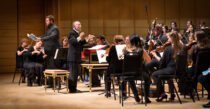
Pacific Baroque Orchestra
The ‘house band’ of Early Music Vancouver, The Pacific Baroque Orchestra (PBO) is recognized as one of Canada’s most exciting and innovative ensembles performing “early music for modern ears.” Formed in 1990, the orchestra quickly established itself as a force in Vancouver’s burgeoning music scene with the ongoing support of Early Music Vancouver. In 2009, PBO welcomed Alexander Weimann as Director. His imaginative programming, creativity and engaging musicianship have carved out a unique and vital place in the cultural landscape of Vancouver.
PBO regularly joins forces with internationally-celebrated Canadian guest artists, providing performance opportunities for Canadian musicians while exposing West Coast audiences to a spectacular variety of talent. The Orchestra has also toured throughout BC, the northern United States, and across Canada. Their 2019 East Coast Canadian tour with Canadian soprano Karina Gauvin culminated in a critically acclaimed album, Nuit Blanches, released by Atma Classique.
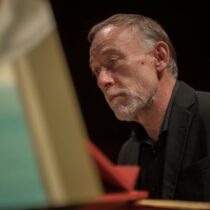
Alexander Weimann, dir. & harpsichord
Alexander Weimann is one of the most sought-after ensemble directors, soloists, and chamber music partners of his generation. After travelling the world with ensembles such as Tragicomedia, Cantus Cölln, the Freiburger Barockorchester, Gesualdo Consort and Tafelmusik, he now focuses on his activities as Music Director of the Pacific Baroque Orchestra in Vancouver, Music Director of the Seattle Baroque Orchestra, and regular guest conductor of ensembles including the Victoria Symphony, Symphony Nova Scotia, Arion Baroque Orchestra in Montreal and the Portland Baroque Orchestra.
Alex was born in Munich, where he studied the organ, church music, musicology (with a summa con laude thesis on Bach’s secco recitatives), theatre, mediæval Latin, and jazz piano, supported by a variety of federal scholarships. From 1990 to 1995, he taught music theory, improvisation, and Jazz at the Munich Musikhochschule. Since 1998, he has been giving master classes in harpsichord and historical performance practice at institutions such as Lunds University in Malmö, the Bremen Musikhochschule, the University of California (Berkeley), Dartmouth College (New Hampshire), McGill University, Université de Montréal, and Mount Allison (New Brunswick). He now teaches at the University of British Columbia and directs the Baroque Orchestra Mentorship Programme there. He has received several JUNO and GRAMMY Award nominations – most recently, for the album Nuit Blanches with the Pacific Baroque Orchestra and Karina Gauvin.
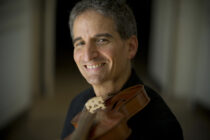
David Greenberg, violin
For three decades, David has enjoyed a double career as a Baroque violinist and Cape Breton fiddler. His fluency and experience in these two genres makes him uniquely qualified to interpret the wild music of 18th-century Scotland.
David is a graduate of Indiana University’s Early Music Institute, where he studied with Stanley Ritchie. He has performed, taught, and recorded primarily in North America and Western Europe, as well as in Australia, New Zealand, and the Far East.
David has performed with Tafelmusik, Red Priest, Les Musiciens de Saint-Julien, Concerto Caledonia, Apollo’s Fire, Ensemble Caprice, La Nef, Toronto Consort, Seattle Baroque, Les Voix Humaines, Chris Norman, Suzie LeBlanc, Doug MacPhee, and Musica Pacifica. He has performed as guest soloist/director with several orchestras, including the Calgary Symphony Orchestra and Symphony Nova Scotia.
He has recorded over 80 CDs, including with most of these ensembles and collaborators, as well as three groundbreaking Scottish-Cape Breton-Baroque recordings with his own ensemble Puirt A Baroque in the 1990s.
David co-authored The DunGreen Collection (1996), an influential treatise on Cape Breton fiddling. He is also a composer and arranger. Many of his tunes have been recorded by Cape Breton musicians such as Buddy MacMaster, Carl MacKenzie, Jerry Holland, and The Rankins.
David enjoys sharing his passion and knowledge about Baroque and Cape Breton music in workshop settings. His current solo touring program is called Bach & Tunes: Multiple Voices for One.
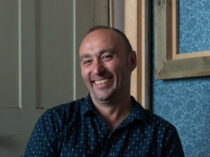
David McGuinness, harpsichord
David McGuinness divides his time between historical Scottish music and contemporary work. As director of early music ensemble Concerto Caledonia he has made fifteen albums, mostly of newly-rediscovered repertoire, and collaborated with musicians in a variety of genres from folk to punk cabaret.
Recently he has been playing historical pianos in traditional music: 2018’s What News is a collection of traditional Scots ballads with the singer Alasdair Roberts and sound artist Amble Skuse, and in 2022 he recorded an instrumental album with concertina player Simon Thoumire. In the ongoing performance project Nathaniel Gow’s Dance Band, Concerto Caledonia plays late 18th-century Scottish dance music while the audience dances the original figures.
David has been a music producer and composer for television and radio, most notably on several seasons of E4’s TV drama Skins. In 2007 he produced John Purser’s 50-part history of Scottish music for BBC Radio Scotland and co-ordinated the station’s observance of No Music Day with the artist Bill Drummond. In 2019 Sony Music reissued the Prefab Sprout album I Trawl the Megahertz, for which he provided the string arrangements.
He is Senior Lecturer in music at the University of Glasgow, and was principal investigator on the AHRC-funded research project Bass Culture in Scottish Musical Traditions. 2022 sees the publication of his edition of the music for Allan Ramsay’s ballad opera The Gentle Shepherd for Edinburgh University Press, and a recording with Concerto Caledonia of Ramsay’s songs.
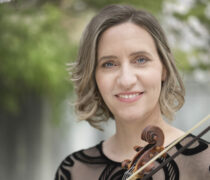
Chloe Meyers, violin
Violinist Chloe Meyers is a regular guest leader and orchestra member of baroque ensembles all over North America. She has worked with ensembles including Les Violons du Roy, Tafelmusik, the Montreal Symphony Orchestra, Ensemble Les Boréades, the Theatre of Early Music, Les Idées Heureuses and Les Voix Baroques. She recently joined the Pacific Baroque Orchestra as concertmaster and will continue to play principal second with Arion Baroque Orchestra in Montreal. Most recently she played first violin on a Juno Award winning recording of Handel arias featuring Canadian soprano Karina Gauvin on the Atma Classique label.
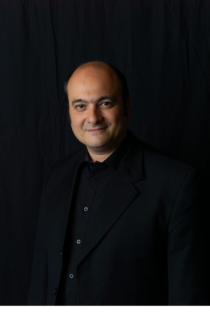
Marco Vitale, harpsichord
Marco Vitale was born in Palermo, Italy. After finishing studies in his hometown, he attended the Royal Conservatoire in The Hague where he studied harpsichord with Ton Koopman and organ with Jos van der Kooy, graduating with a master’s degree in Early Music. Throughout his career Marco has performed at the most prestigious venues and festivals throughout Europe, the USA, Canada, South America, the Middle East and Asia, such as Château de Versailles spectacles, Philharmonie de Paris, Salle Pleyel Paris, Ambronay Festival, Grand Théâtre de Bordeaux, Oude Muziek Utrecht, Concertgebouw Amsterdam, L’Auditori in Barcelona, Styriarte Festival in Graz, Misteria Paschalia Kraków, National Music Forum Wroclaw, KKL Luzern, Roma Festival Barocco, Echi Lontani in Cagliari, Teatro Ristori di Verona, Philharmonie Luxembourg, Lincoln Center and Carnegie Hall in New York, Seoul Arts Center, USACH festival in Santiago de Chile, Gran Teatro Nacional de Lima (Peru), Teatro Metropolitano José Gutiérrez Gómez in Medellin (Colombia), Teatro Mayor “Julio Mario” de Bogotà (Colombia).
From 2008-2011 Marco Vitale worked at the Higher Institute of Music in Damascus, Syria, where he taught early music performance practice and performed concerts together with Syrian musicians.
He is the co-founder and musical director of Contrasto Armonico, an ensemble specializing in Baroque operas and the performance of music in the Italian style, using period instruments and historically informed performance practices. In 2012 he founded his own record label ayros, which features recordings by Contrasto Armonico and other artists. In a collaboration with ayros, Marco is currently involved in recording the Complete Italian Cantatas by Handel, a thrilling project that will bring to light many undiscovered jewels of Handel’s which have yet to be either edited or recorded. Marco has appeared on several radio and TV broadcasts, including the specialized music channel Mezzo.tv. In addition to ayros, he has recorded for Alia Vox, Naïve, and Brilliant Classics.
Mr. Vitale appeared as a guest conductor of the Warsaw Chamber Opera between 2015 and 2017, performing a variety of repertoire from Monteverdi madrigals to Mozart symphonies. In 2016-2017 he revived the opera Semiramide riconosciuta by Leonardo Vinci, conducting from the harpsichord at the Baroque Opera festival in Warsaw. This was the first time in three centuries that this opera had been performed.
In 2018 he composed Il ratto di Helena, an opera in 17th century style based on a libretto written by Virgilio Puccitelli (1636). The opera was commissioned by The Palace of the Grand Dukes of Lithuania, and performed in Vilnius in celebration of 100 years of Lithuanian independence.
Marco gives masterclasses in harpsichord and Early Music performance practice. He is the artistic director of the Arcadia Early Music Academy workshop in Poland and teaches at La Pellegrina s ummer school in the Czech Republic. He gives masterclasses, lectures and workshops at the Fryderyk Chopin University of Music in Warsaw, Fondazione Paolo Grassi in Martina Franca (Italy), ESMUC in Barcelona, the Higher Institute of Music in Damascus, and the University of Southern California in Los Angeles. Since 2017 Marco has been the music director of the Denman Baroque Workshop & Festival organized by Andrew Fyson and Robert Newton, which takes place every spring on Denman Island, British Columbia.
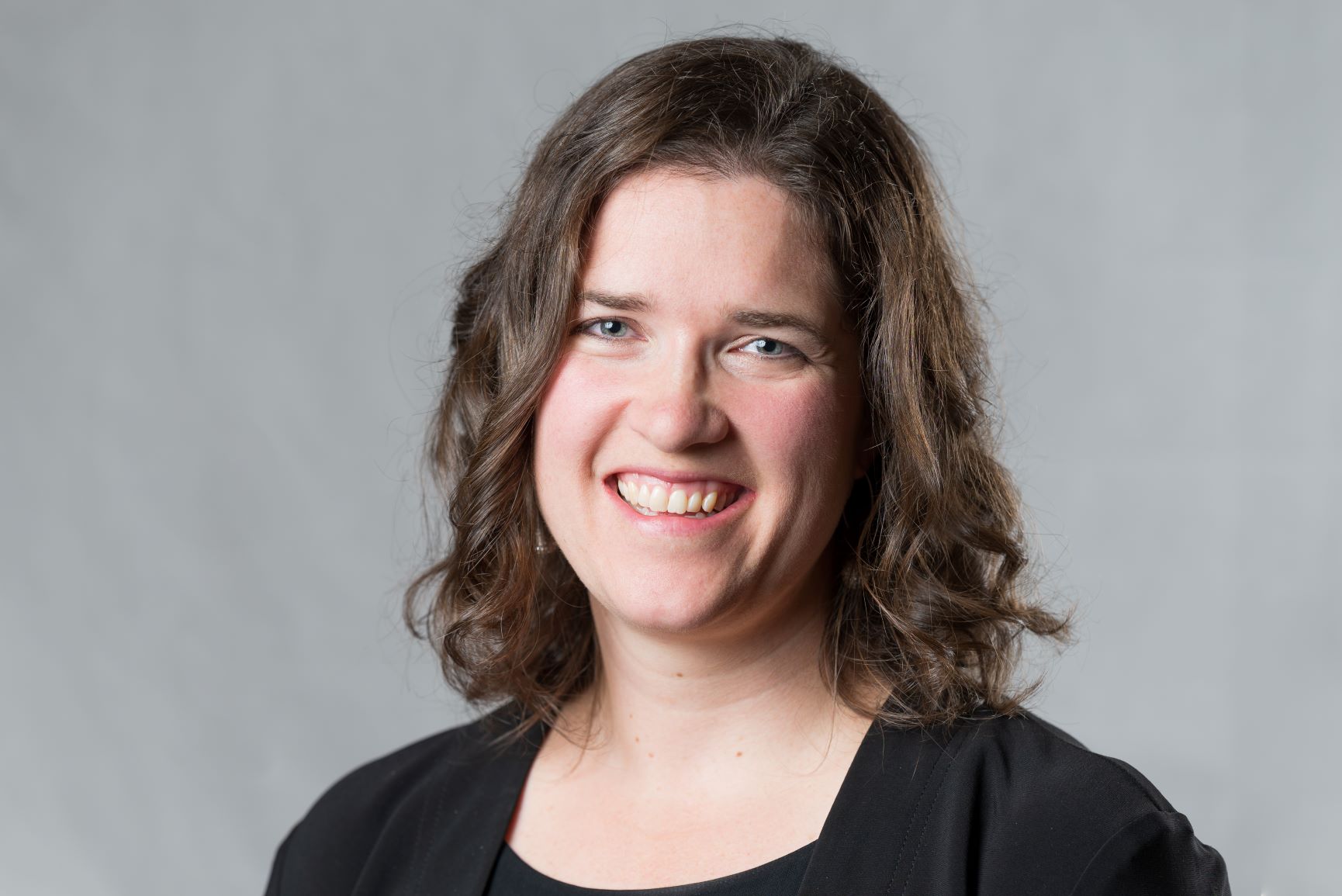
Christina Hutten, harpsichord
Organist and harpsichordist Christina Hutten has presented recitals in Canada, the United States, and Europe. She performs regularly with Pacific Baroque Orchestra and has appeared as concerto soloist with the Okanagan Symphony, the Vancouver Academy of Music Symphony Orchestra, and the Arizona State University Chamber Orchestra. Christina is also an enthusiastic teacher. She coaches and coordinates the early music ensembles at the University of British Columbia and has given masterclasses and workshops at institutions including the Victoria Baroque Summer Program, Brandon University, the University of Manitoba, Wilfrid Laurier University, Canada’s National Music Centre in Calgary, and the Tafelmusik Baroque Summer Institute. Funded by a generous grant from the Canada Council for the Arts, she pursued historical keyboard studies in Europe with Francesco Cera, François Espinasse, and Bernard Winsemius. She participated in the Britten-Pears Programme, led by Andreas Scholl and Tamar Halperin, for which she was awarded the Loewen Prize. Christina obtained a master’s degree in Organ Performance from Arizona State University under the direction of Kimberly Marshall and an Advanced Certificate in Harpsichord Performance from the University of Toronto, where she studied with Charlotte Nediger. She is now a doctoral candidate in musicology at UBC.


